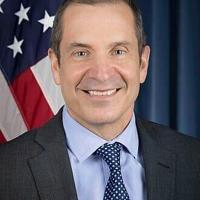Africa-Press – Liberia. The U.S. Embassy and the Liberia National Bar Association (LNBA) have reaffirmed their commitment to the establishment of the War and Economic Crimes Court (WECC) in Liberia and promoting accountability and the rule of law.
US Ambassador Mark C. Toner, along with civil society leaders, activists, and transitional justice actors, expressed this dedication at a recent transitional justice stakeholders’ roundtable hosted by the U.S. diplomat.
They aim to support the Boakai-led administration in addressing transitional justice issues such as the WECC.
At an acquaintance meeting held at the Embassy with stakeholders on Wednesday, August 21, Ambassador Toner emphasized the U.S. government’s readiness to collaborate with the LNBA and transitional justice stakeholders to enhance the rule of law, accountability, and governance in Liberia.
LNBA’s President, Sylvester Rennie, welcomed this collaboration and commended Ambassador Toner’s appointment by U.S. President Joe Biden as a positive step in strengthening the relationship between Liberia and the U.S. Rennie noted that the rule of law is a center pillar to the US’ approaches to promoting justice, peaceful & Inclusive societies in line with democratic institutions.
Access to legal services was noted as crucial for poverty reduction, gender equity, and sustainable development in Liberia, with Cllr. Rennie emphasized the importance of justice in upholding human rights.
“Access to justice guarantees the respect for all human rights in any democratic nation,” he indicated.
The discussions highlighted joint efforts to support Liberia’s peace initiatives and transitional justice with international community involvement.
In a related development, the LNBA commended the United Nations Peace Building Commission (PEC) to Liberia for convening a meeting focusing on transitional justice and Youth, Peace & Security, in York, United States of America
The gathering, chaired by Sweden’s Ambassador to the UN, provided an opportunity for participants to discuss Liberia’s peacebuilding, the establishment of a War and Economic Crimes Court, and the National Action Plan on Youths Peace and Security (YPS).
It can be recalled that the US government, through the USAID Legal Professional Development and Anti-Corruption Program, funded the LNBA through the Legal Aid Program (Clinics) that was able to provide pro bono legal services for so many Liberians who cannot afford to hire a lawyer.
The clinic operated in five of Liberia’s fifteen Counties including Montserrado, Margibi, Bomi, Grand Bassa, and Bong. USAID-LPAC also provided financial, material, and technical support to the pro bono legal services.
The involvement of the U.S. government through USAID’s Legal Professional Development and Anti-Corruption Program in supporting the LNBA’s Legal Aid Program (Clinics) was acknowledged for providing pro bono legal services in several Liberian counties.
For More News And Analysis About Liberia Follow Africa-Press






